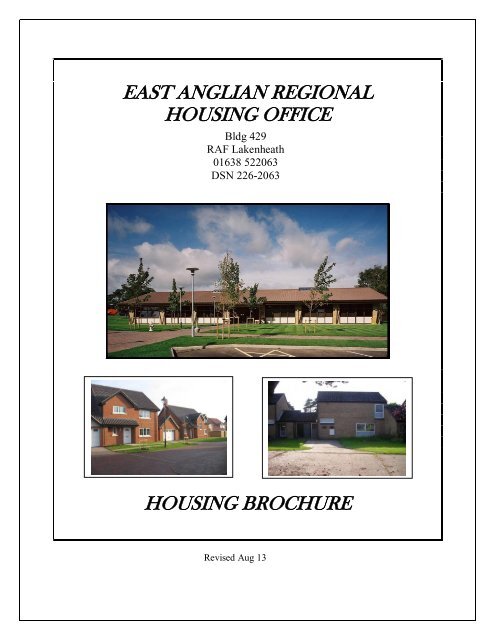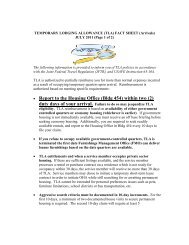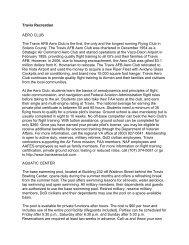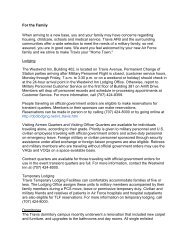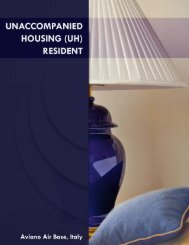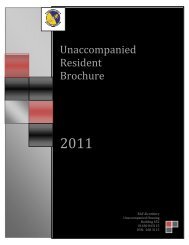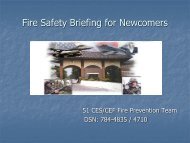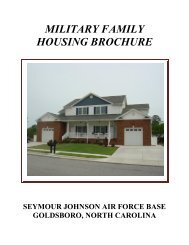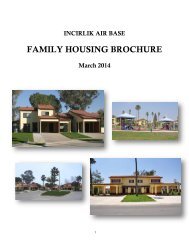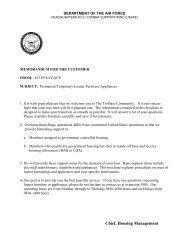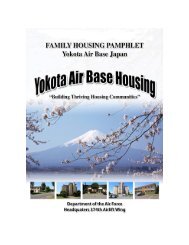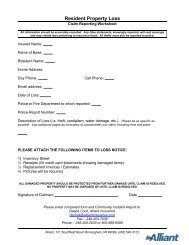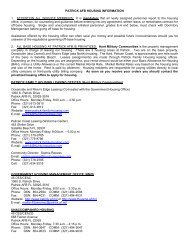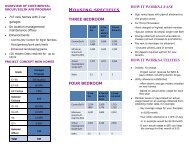Government Housing Brochure - Air Force Housing
Government Housing Brochure - Air Force Housing
Government Housing Brochure - Air Force Housing
Create successful ePaper yourself
Turn your PDF publications into a flip-book with our unique Google optimized e-Paper software.
EAST ANGLIAN REGIONAL<br />
HOUSING OFFICE<br />
Bldg 429<br />
RAF Lakenheath<br />
01638 522063<br />
DSN 226-2063<br />
HOUSING BROCHURE<br />
Revised Aug 13
INTRODUCTION<br />
Welcome to Renting off base<br />
This brochure has been prepared in order to help you understand general housing policy and<br />
procedure. The following pages will also help explain our responsibilities towards your home as<br />
well as what is expected from you.<br />
Your home represents a substantial investment by the United States <strong>Air</strong> <strong>Force</strong> and we need your<br />
help in protecting that investment and minimizing additional expenditure of funds for repair, due<br />
to unnecessary damage.<br />
If you are considerate of your neighbors and treat your home as if you were the owner, we can<br />
assure you that not only are relationships enhanced at all levels, but that you will also be able to<br />
provide a better home and community for future families.<br />
As it is impossible to itemize every small detail or circumstance, we welcome you to contact the<br />
<strong>Housing</strong> Facilities section at 01638 52 2064. If your question cannot be answered at this point,<br />
details will be taken and the information will be passed on to your housing inspector for their<br />
immediate attention.<br />
We sincerely hope that your stay in Family <strong>Housing</strong> is both pleasant and rewarding.<br />
With Kind Regards<br />
The <strong>Housing</strong> Staff<br />
- 2
INDEX<br />
Section 1 – <strong>Air</strong> <strong>Force</strong> Responsibilities<br />
Initial Inspection………………………………………………………………………….. 6<br />
Appliances………………………………………………………………..………….…… 6<br />
Key Issue…………...…………………………………………………….………………. 6<br />
Lock outs…………...…………………………………………………….………………. 6<br />
Trash Collection …………………………………………………………………………. 7<br />
Recycling and Trash Information………………………………………………………… 7<br />
Abandoned / Un-Roadworthy Vehicles…………….……………………………………. 8<br />
Grounds Care………………………………………………………………………..…… 8<br />
Yard Inspections…………………………………………………………………………. 8<br />
Section 2 – Resident Responsibilities<br />
Good Neighbors…………………………………………………………………………. 9<br />
Noise Control……………………………………………………………………………. 9<br />
Your Children …………………………………………………………………………… 9<br />
Parking…………………………………………………………………………………… 9<br />
Going TDY / Leave…………..………………………………………………………….. 9<br />
Care of your Family <strong>Housing</strong> Unit………………………………………………………. 10<br />
Good Housekeeping ………………………………………………………………… 10<br />
Floors………………………………………………………………………………… 10<br />
Walls………………………………………………………………………………… 10<br />
Ceilings……………………………………………………………………………… 10<br />
Appliances…………………………………………………………………………… 10<br />
Stove…………………………………………………………………………………. 10<br />
Kitchen Exhaust Fan………………………………………………………………… 10<br />
Dryers………………………………………………………………………………... 10<br />
Dishwasher.………………………………………………………………………….. 11<br />
Microwaves………………………………………………………………………….. 11<br />
Garbage Disposal Units……………………………………………………………... 11<br />
Lime Scale…………………………………………………………………………… 11<br />
Grass………………………………………………………………………………… 11<br />
Snow/Ice Removal………………………………………………………………….. 11<br />
Shrubs and Flower Beds…………………………………………………………….. 11<br />
Trash…………………………………………………………………………………. 11<br />
Windows…………………………………………………………………………….. 11<br />
Miscellaneous Items…………………………………………………………………. 11<br />
Hazardous Materials……………………………………………………………………… 12<br />
General Observations…………………………………………………………………….. 12<br />
Damages………………………………………………………………………………….. 12<br />
Damage Assessments Form………………………………………………………………. 12<br />
Examples of Damage beyond Fair, Wear & Tear …………………………………..……. 12<br />
Insurance………………………………………………………………………………….. 12<br />
Failure to Comply with <strong>Housing</strong> Standards……………………………............................. 12<br />
Section 3 – General Information<br />
Utilities ……………………..………………………………………………….……. 13<br />
Energy Conservation………………………………………………………………… 13<br />
What not to flush…………………………………………………………………….. 13<br />
Water restrictions……………………………………………………………………. 13<br />
Heating Thermostat Control ………………………………………………………… 13<br />
Oil Tank Supply ……………………………………………………………………. 14<br />
AFN………………... …………………………………………………………………… 14<br />
Waterbeds………………………………………………………………………………… 14<br />
Candles/Oil burners……………………………………………………………………….. 14<br />
Business Enterprises………………………………………………………………………. 14<br />
- 3
Registered Childcare………………..…………………………………………………….. 14<br />
Exterior Electrics…………………………………………………………………………. 14<br />
Fire Pits…………………………………………………………………………………… 15<br />
<strong>Air</strong> Conditioning Units…………………………………………………………………… 15<br />
Christmas / Festive Lights…..……………………………………………………………. 15<br />
Pest Control……………………………………………………………………………….. 15<br />
Birds Nests ……………………………………………………………………………….. 15<br />
Fireworks……..…………………………………………………………………………… 15<br />
Yard Sales……………………………………………………………………………….... 15<br />
Solicitation in <strong>Housing</strong> Area…………………………………………………………...…. 15<br />
Recreational Equipment / Activities………………………………………………………. 15<br />
Basketball Hoops …………………………………………………………………………. 15<br />
Swimming / Wading Pools/ Water Features ……………………………………………… 16<br />
Trampolines ………………………………………………………………………………. 16<br />
Bicycle Users……………………………………………………………………………… 16<br />
Phones …………………………………………………………………………………….. 16<br />
Section 4 – Self Help<br />
Self Help Stores.….…………….…………………………………………………………. 17<br />
Self Help Project Coordination…………………………………………………………..... 17<br />
Pre-project Inspection…..………………………………………………………………… 17<br />
Post-project Inspection…..……………………………………………………………… 17<br />
Maintenance Responsibility………………………………………………………………. 17<br />
Fences…………………………………………………………………………………….. 17<br />
Standard Specification……………………………………………………………………. 17<br />
Position……………………………………………………………………………………. 18<br />
Sheds/Storage Containers………………………………………………………………..... 18<br />
Patios……………………………………………………………………………………… 18<br />
Ceiling Fans……………………………………………………………………………….. 18<br />
Satellite Dishes……………………………………………………………………………. 18<br />
Landscaping………………………………………………………………………………. 19<br />
Window / Door Bug Screens …………………………………………………………….. 19<br />
Carpet/Vinyl Flooring…………………………………………………………………….. 19<br />
Painting/Wallpaper/Borders………………………………………………………………. 19<br />
Patio Lean-to/Carports……………………………………………………………………. 19<br />
Section 5 – Pets<br />
Pet Abuse………………………………………………………………………………… 20<br />
Conditions for Keeping Pets in <strong>Housing</strong>…………………………………………………. 20<br />
Section 6 – Security<br />
Reporting Crime………………………………………………………………………….. 21<br />
Member’s Responsibilities……………………………………………………………….. 21<br />
Cars……………………………………………………………………………………….. 21<br />
Personal Safety………………………………………………………………………….... 22<br />
What Can I Do ……………………………………………………………………….… 22<br />
Intruders ………………………………………………………………………………….. 22<br />
Interrupting Burglars…………………………………………...……………………… 22<br />
Self Defense ………………………………………………………………………………. 22<br />
Ministry of Defense Police……………………………………………………………….. 23<br />
A Partnership……………………………………………………………………………… 23<br />
Neighborhood Watch……………………………………………………………………... 24<br />
Your Child Security ……………………………………………………………………… 24<br />
Child Neglect and Abuse…………………………………………………………………. 24<br />
Curfew…………………………………………………………………………………….. 25<br />
Child Supervision Guidelines…………………………………………………………….. 25<br />
Section 7 – Safety Awareness<br />
Carbon Monoxide and Smoke Detectors…………………………………………………. 26<br />
- 4
Storage of Hazardous Material…………………………………………………………… 26<br />
Burning Candles in your home…….…………………………………………………...… 26<br />
Kitchen/Cooking Fire Safety …………………………………………………………….. 26<br />
Legionnaires’ Disease ……………………………………………………………………. 27<br />
BBQ/Smokers/Fire Pits………………………………………………………………….. 27<br />
Fire/Emergency Reporting Procedures………………………………………………..….. 27<br />
Section 8 – Termination of Military Family <strong>Housing</strong><br />
Terminating <strong>Housing</strong>….………………………………………………………………….. 28<br />
Pre and Final Inspections………………………………………………………………….. 28<br />
PCS’ing With Pets………………………………………………………………………… 28<br />
Environmental………………………………………………………..…………………… 29<br />
Section 9 – Useful Telephone Numbers…………………………………………………… 30<br />
- 5
Section 1 – <strong>Air</strong> <strong>Force</strong> Responsibilities<br />
Initial Inspection: A housing representative will meet the military<br />
member at the pre-scheduled date and time to perform an initial walk<br />
through inspection of the unit. This will normally be held on the day<br />
that the keys are officially accepted by the new resident and will<br />
determine the point at which <strong>Housing</strong> Allowances are affected. The<br />
member needs to allow 75 minutes for the inspection and all related<br />
paperwork to be completed. All emergency cut off service points,<br />
heating operations and general features of the housing unit will be<br />
identified. An AF form 227 Quarters Condition Inspection Report<br />
will be completed, recording any significant discrepancies pertaining to the condition of the<br />
property, grounds and domestic appliances. Any other discrepancies found by you after this<br />
inspection, should be reported to a housing representative within 15 calendar days, so that either<br />
the AF form 227 can be amended, or an inspection of the items be arranged.<br />
Appliances: Cooking ranges, microwave ovens, washers, dryers, refrigerators<br />
and dishwashers are government furnished and serviced. These appliances will<br />
remain your responsibility during occupancy and must not be removed from your<br />
quarters, or placed in external storage sheds. If you have noticed any problems<br />
with the appliances other than simple filter cleaning or replacement, please do not<br />
attempt repair. All appliance problems must be called in as soon as possible to the FMO<br />
Appliance Call Desk Operator 01638 52 7156.<br />
Key Issue: Where possible we endeavor to issue two full sets of keys on the initial inspection.<br />
Residents’ children who are 10 years or older, are authorized their own door key. These<br />
additional keys can be made at the 48 CES structure shop, Bldg. 1106, RAF Lakenheath<br />
Monday-Friday between 1300hrs and 1400hrs, with the exception of Lords Walk <strong>Housing</strong>,<br />
please contact your <strong>Housing</strong> Inspector who will advise. For additional key authorization, please<br />
take a copy of your AF form 227, on which approval will be annotated by the <strong>Housing</strong><br />
Representative. For all other key duplication requirements, please visit the Outdoor Recreation<br />
Center, or local key cutting shops.<br />
Lockouts: In circumstances when a resident has locked themselves out of their home, call<br />
<strong>Housing</strong> Maintenance. In some situations entry may be possible. However most cases the lock<br />
may have to be drilled out by <strong>Housing</strong> Maintenance or a skilled locksmith. This will be at the<br />
resident’s expense. To avoid such circumstances, leave a spare key at work, or entrust one with<br />
a friend or neighbor.<br />
- 6
Trash Collection: We must all work together to keep our housing areas free<br />
of litter and unsightly trash receptacles. Please place your trash bags or<br />
wheelie bins (as applicable to your <strong>Housing</strong> Area) at the nearest point of the<br />
street curb on the morning of your scheduled day of collection and return bins<br />
to their storage area that same evening. They must never be left out overnight.<br />
Residents that are under a wheelie bin system must ensure that all trash is safely stored within<br />
the container, with the lid fully closed. Residents with excess trash must either dispose of it at<br />
the local council household waste site, or carry it over to the following week. Never leave items<br />
on the ground around the bin. Please note: Strictly no bagged items in the Dry Recycle or<br />
Compost Bins. Failure to comply with this will result in these bins being rejected.<br />
Stockpiles of cardboard boxes are not permitted to be left out for the trash collectors. Ensure that<br />
either the furniture packers remove the boxes, dispose of them at your local household waste<br />
sites, or take to the Base Recycling Center.<br />
The following details provide you with an idea as to what is allowed in each bin:<br />
General Waste Bin: General household waste, pet waste, diapers, glass, cooked food, clothing<br />
Recycling Bin: Dry recyclables such as plastic, cardboard, aluminum/tin cans, paper, junk mail<br />
(no glass or Styrofoam)<br />
Compost Bin: Grass cuttings, fruit, vegetable peelings, leaves, coffee grounds, tea bags<br />
The local authorities will advise you whenever schedules change, due to public holidays.<br />
All wheeled bins must be clearly marked with your house number. Bins left unclaimed will be<br />
removed from the housing area by the Council. If your trash bin goes missing, you will be<br />
charged for a replacement from the local council.<br />
Recycling and Trash Information: Occasionally, there may be items that will not fit into the<br />
bins or bags provided. These items must be taken to the base recycling areas, to local household<br />
waste sites, or arranged to be collected by the local council.<br />
<strong>Housing</strong> Areas Council Household Waste Site<br />
RAF Lakenheath, Forest Heath District<br />
RAF Mildenhall, Beck Council<br />
Row, Lords Walk Tel. (01638) 719207 roundabout.<br />
RAF Feltwell Kings Lynn & West<br />
Norfolk Council<br />
Tel. (01553) 776676<br />
RAF Ely<br />
Thetford<br />
East Cambs Council<br />
Tel. (01353) 863864<br />
(General Domestic)<br />
Tel. (01353) 616399<br />
Furniture or appliances<br />
Breckland Council<br />
Tel. (01842) 755721<br />
Sign posted off the A1065 between RAF<br />
Lakenheath Gate 1 and Barton Mills 5 ways<br />
Sign posted off the A1065 between RAF<br />
Lakenheath Gate 1 and Barton Mills 5 ways<br />
roundabout.<br />
Turn into Depot Road, off the Exning Road<br />
in Newmarket.<br />
Alternatively follow signs between Little<br />
Thetford and Stratham villages<br />
Sign posted on London Rd Industrial Estate,<br />
(opposite Focus DIY store) Thetford<br />
- 7
Abandoned/Unroadworthy Vehicles: If your vehicle is not in a<br />
road-worthy condition, i.e. has an expired tax disc or is inoperable, it<br />
must be removed from the housing area. Do not leave abandoned or<br />
unroadworthy vehicles in parking bays or in general housing areas.<br />
Abandoned vehicles will be impounded and crushed. Placing a<br />
Statutory off Road Notification (SORN) on your vehicle does not exempt you from the above<br />
regarding removal of abandoned or unroadworthy vehicles in housing areas. Owners of vehicles<br />
without road tax can be prosecuted and will be required to remove the vehicle from the housing<br />
area. Do not carry out major car repairs in the housing area, and never leave your vehicle on<br />
ramps or jacks. Always park your car in your allocated space. Do not leave your car parked on<br />
roads, or on sidewalks and never park on the grass. Obstructing a public sidewalk or parking too<br />
close to road junctions and roundabouts is a road traffic offense. Boats, campers, RVs, caravans,<br />
trailers and unused vehicles should be parked on base and not in the housing area. Please call<br />
your law enforcement desk for details regarding storage areas on base where these vehicles can<br />
be parked long term.<br />
Grounds Care: Common areas, which are normally beyond 50 feet from your <strong>Housing</strong> Unit,<br />
are normally Ground Controls responsibility. Responsibilities include but are<br />
not limited to the following: grass cutting, landscaping to shrubs and trees etc.<br />
Residents should never permit their pets to freely roam and exercise on these<br />
common areas, especially playground zones. Litter bins and pet waste<br />
containers will be emptied on a regular basis by Maintenance or Ground<br />
Control. Please note that the contractor is not responsible for picking up pet<br />
waste.<br />
Yard Inspections: The housing inspector’s will perform regular area inspections to observe<br />
general appearances of yards and streets. Residents that persistently fail to take responsibility of<br />
their own individual areas will receive discrepancy notices. Repeated notices will be forwarded<br />
up the Chain of Command for resolution. For some residents this may lead to a loss of housing<br />
privileges.<br />
The government and contractors are spending valuable resources and efforts in keeping your<br />
housing area maintained. Please do your part and keep your area PROUD.<br />
- 8
Section 2 – Resident Responsibilities<br />
Good Neighbors: Please be courteous to your neighbors. Be reasonable, considerate and talk to<br />
your neighbors should a problem or misunderstanding arise. In most situations the matter can be<br />
satisfactorily resolved amicably. However, in situations where this may not be possible, please<br />
contact each other’s First Sergeants and allow them to defuse the situation. The housing<br />
inspector may also be requested to assist in matters that directly involve housing policy.<br />
We must all work together in order to maintain a civil, social and livable environment. Do your<br />
part to forge and maintain a good relationship with your neighbor.<br />
Please consider the following points:<br />
Noise control: Excessive noise is the primary complaint received by the<br />
<strong>Housing</strong> Office. General quiet times are from 2200hrs to 0800hrs.<br />
Please respect neighbors that work shifts and have varying sleep<br />
patterns. Prolonged periods of loud music, excessive noisy parties, or<br />
the continual sound of dogs barking can cause significant distress to<br />
your neighbors and dissension within the neighborhood. Be a good<br />
neighbor. Keep the noise down!<br />
Your children: Do you know where your children are Please ensure that they are playing in a<br />
safe and appropriate environment and not causing a nuisance to your neighbors.<br />
Parking: Vehicles are strictly prohibited from parking on grass. Please use<br />
only the parking spaces allocated to you (garage and drive for Liberty<br />
Village and RAF Feltwell PIK housing). If you share an unmarked parking<br />
bay, please verify your space with the housing inspector and not park in<br />
your neighbors spot. If you are authorize to have more than two vehicles,<br />
this does not authorized you to use more than your allocated parking spaces.<br />
Please do not park on footpaths, double yellow lines, or close to junctions. Emergency and trash<br />
collection vehicles must always have full unrestricted access to your housing area. You are<br />
responsible for the damage you cause by incorrectly parking.<br />
Going on TDY/Leave: If you leave your housing unit unoccupied for more than seven days,<br />
you must inform the housing office. A form can be filled out at the housing office, or e-mail<br />
your housing inspector. Information should include your dates of departure and return with<br />
contact details of the person looking after your home. Arrangements must be made in advance<br />
for someone to visit your housing unit at least twice a week until you return. Ensure that mail is<br />
removed away from the doorway, windows and doors checked, look for water leaks on floors<br />
and ceilings on each visit. Also, ensure they maintain your lawn during your absence. In case of<br />
emergencies provide them the maintenance contact details. Your fridge magnet should also<br />
provide these emergency numbers. During winter months (Oct-Mar), ensure that your main<br />
heating thermostat is set at 15C/60F to avoid frozen pipes.<br />
- 9
CARE OF YOUR HOUSING UNIT:<br />
You are responsible for minor maintenance of your home. We expect you to take prudent care of<br />
your home, to include good housekeeping and garden care. Please respect and be proud of this<br />
valuable government asset.<br />
Good Housekeeping: Regular cleaning is necessary in your home to maintain a tidy, safe and<br />
healthy environment for your family.<br />
Floors: Clean floor surfaces regularly. Be aware of the risks of permanent carpet staining (i.e.<br />
Kool-Aid, blackcurrant juice, red wine, bleach, nail polish, ink, or various crafts paint and glues).<br />
If you have sheet vinyl flooring in the kitchen, utility areas or bathrooms, remember that these<br />
surfaces can tear easily when appliances are pulled out. Always tilt the machine back and slide<br />
under a slip mat or piece of cardboard before pulling them away from the wall. Clean behind<br />
and underneath your appliances periodically, especially the dryer.<br />
Do not apply heavy layers of wax to tiled surfaces, as build up can be unhealthy and also very<br />
difficult to remove on your housing termination. Please avoid using ‘rubber backed’ mats as<br />
these can cause unsightly permanent yellow staining to floors if left in position for long periods.<br />
Walls: Keep vents and ducts as clear as possible. Check behind your dryer to ensure the lint<br />
hose has not become disconnected or kinked and check the external vent to ensure good air flow.<br />
Call in all loose, cracked electrical outlets or switches to your maintenance provider. If you wish<br />
to paint or apply wall coverings, complete an AF form 332 at the <strong>Housing</strong> Office. Your<br />
inspector will advise you of preparation, material specifications and your responsibilities when<br />
vacating the home. Do not purchase your items prior to approval. Caution must be applied<br />
when hanging pictures and will be explained during your initial inspection (see section 4 – Self<br />
help). Do not drill holes in to UPVC windows or doors. Be aware of soot/wax build-up to walls<br />
and ceilings due to burning of candles, oil lamps and incense burners. Excessive build-up will<br />
likely require additional wall preparation during change of occupancy maintenance. This will be<br />
at your expense.<br />
Ceilings: Do not attach ceiling fans until you have coordinated an AF form 332 through the<br />
<strong>Housing</strong> Office. Fans need to be installed by a qualified UK electrician and proof will be<br />
required. Do not hang heavy items or attach hooks and nails to ceilings (this includes garages).<br />
Do not enter the attic space, as these are not designed for storage and are therefore prohibited.<br />
Appliances:<br />
Stoves - Regularly clean your stove to include drip pans, racks, stove top and interior of oven.<br />
This will greatly reduce grease build-up and will help prevent the risk of fires.<br />
Kitchen exhaust fan – Change paper filters when excessively soiled. Metal mesh/gauze filters<br />
may be cleaned in the dishwasher.<br />
Dryers – Clean the lint filter after every cycle. If this is not done regularly, your dryer and hose<br />
will clog up. This is apparent when you see lint collecting on the blades of your outside vent<br />
cover. In this instance, to avoid the HIGH RISK of a lint fire, contact housing maintenance to<br />
clear out the vent channel and appliance maintenance to de-lint the channels within the dryer.<br />
DO NOT CONTINUE TO USE THIS APPLIANCE!<br />
- 10
Dishwasher - Keep your dishwashers topped up regularly with dishwasher salt. Some<br />
dishwashers will indicate on the control panel if salt levels are low. Other types may require a<br />
physical inspection inside by unscrewing the Salt Filler cap found under the lower rack.<br />
Dishwasher salt can be purchased at the commissary and the local economy.<br />
Microwaves – Where applicable, please only plug in to the wall sockets labeled ‘Microwave’.<br />
This will prevent the ground floor circuit breaker from popping. When cleaning the internal<br />
glass rotating dish, always handle with great care as these are expensive to replace.<br />
Garbage Disposal Unit – Do not pour oil, lard, or fat into this drain, as the change of<br />
temperature that occurs in the pipes can cause them to solidify. Please do not dispose vegetable<br />
peelings, rice, spaghetti and pasta in this unit as these items can also cause blockage. Always<br />
keep the water running during use.<br />
Regularly check service hook ups behind your appliances for signs of water leaks, lint escape<br />
from hoses, or possible electrical damage such as burned outlets and damaged cables.<br />
Lime Scale: It is important not to let lime scale build up in any appliances or fixtures, i.e. sinks,<br />
toilet, shower heads. Do not use abrasives to remove lime scale and do not allow chemicals too<br />
remain on chrome fittings for too long. Follow manufacturer’s guidelines when using any type<br />
of lime scale removal. Do not use lavatory cleaners on stainless steel as it will turn the stainless<br />
steel black. Should you have any questions regarding persistent lime scale build up, your<br />
housing inspector will be able to advise you accordingly.<br />
Grass: You are expected to keep a neat, well-maintained, and edged lawn at all times. Please<br />
keep the grass to a maximum of 2 inches in height and generally free from weeds, moss and<br />
heavy seasonal leaf fall. Residents that have pets should ensure that feces are collected daily and<br />
holes created by dogs are filled and re-seeded at regular intervals when required.<br />
Snow/Ice Removal: It is the resident’s responsibility to clear snow and ice from their footpaths,<br />
sidewalks and driveways up to 50 feet from the housing unit.<br />
Shrubs and Flower Beds: Residents are expected to maintain flower-beds. Borders should be<br />
edged and free of weeds and grass growth. Annual flowers should be removed when dying and<br />
all other plants and shrubs should be pruned to a manageable height keeping windows and<br />
footpaths clear. Ivy/climbing/creeping plants should be kept to a minimum and never let them<br />
climb up brick surfaces as this causes severe brick damage to your housing unit.<br />
Trash: All trash bags and wheelie bins must be stored out of sight. Ensure your trash bins are<br />
identified with your house number and street name. Replacements are at resident’s expense.<br />
Windows: Wash any heavy build-up on windows and frames. Packing paper, cardboard or tin<br />
foil on your windows is prohibited in MFH, use appropriate window dressings only. If you own<br />
a pet and can see heavy build-up on your patio door, please be aware that your pet may be<br />
scratching the glass. Damaged glass will require replacement and re-imbursement on your PCS.<br />
Miscellaneous Items: Please keep all privately owned items, i.e. bicycles, toys, in provided<br />
sheds, closets, or rear yard. Sheds and fences must be maintained in good order unless covered<br />
- 11
y maintenance provider. Items such as garden hoses that are regularly used can be left in the<br />
front yard if they are neatly stored on a hose reel or bracket. Never coil them around the faucet or<br />
allow them to leak due to poorly fitting or incompatible joints. Carports and lean-to structures are<br />
not to be used as open storage areas. Keep front doorways free of miscellaneous items.<br />
Hazardous Materials: Do not leave fuel, lubricant oil, or general fluid cans in front<br />
yards or parking areas. These are not only untidy, but can be extremely hazardous.<br />
Do not store old tires, batteries and vehicle parts in any areas. Oil and vehicle fluid<br />
leaks should be neutralized and washed away from surfaces at first opportunity.<br />
Please remember that not only does this look unsightly, but such fluids can remain actively<br />
flammable for some time and may ignite at any time, see manufacturer details for advice.<br />
General Observations: Please contact housing maintenance or your housing inspector should<br />
you notice inoperative streetlights, missing service covers, a drain blockage, structural defects,<br />
storm damage and general hazards around your housing area. The appropriate authorities can<br />
then be contacted for their immediate action.<br />
Damages: Any damage in your housing unit caused by you (the member), your spouse,<br />
dependents, guests or pets, are your responsibility, as per AFI 32-6001. Para. 2.8. Cause of<br />
damage, may be considered fair wear and tear depending on an assessment made by a <strong>Housing</strong><br />
or USAF nominated representative.<br />
Damage Assessment Form: Following notification of any such repairs that are necessary, a<br />
damage assessment form will be issued to the resident on which options for payment and<br />
consideration will be given. Payment or any required correspondence should be completed and<br />
returned to the Facilities Section at the Lakenheath <strong>Housing</strong> Office within seven days from<br />
receipt of the form.<br />
Example of Damages Beyond Fair Wear and Tear: Broken floor tiles, stained carpets, holes in<br />
doors, cracked toilet bowls, toilet seats, sinks, broken windows, burns and abrasions to kitchen<br />
countertops, UPVC products, damaged and missing appliances or equipment, over sprung door<br />
hinges, excessive wall damage, lost keys etc. You could also be liable for damages caused by<br />
failure to report problems in a timely manner to the housing maintenance contractor at early<br />
signs of a fault occurring. For example, always keep an eye on potential water leaks around the<br />
house, or water spots appearing on ceilings and call them in at the very first opportunity.<br />
Insurance: It is not mandatory that you have renters insurance; however, it is highly<br />
recommended. You will be advised to take out a policy by the assignment clerk to cover costs<br />
for building replacement. It is good advice to cover any damages or losses of<br />
your own personal property, but it equally important for you to have coverage<br />
for possible instances such as stains on carpets, fire, broken windows, impact<br />
damage to doors, smoke damage (caused by excessive use of candles),<br />
possible water damage, pet damage, etc.<br />
Failure to Comply with <strong>Housing</strong> Standards: Assignment to housing can be terminated by the<br />
Commander with a 30-day notice when the member or family members are responsible for<br />
- 12
willful, malicious, or negligent abuse or destruction of government property. Such cases will be<br />
fully documented and retained on file at the housing office.<br />
Section 3 – General Information<br />
Utilities: The USAF has contracts with specific utility companies to supply gas, water, oil and<br />
electricity. Do not agree by telephone or in writing to change your utility supplier, or inform<br />
these companies when you are moving in or out of the property. Do not accept incentives from<br />
any utility companies concerning the above.<br />
Energy Conservation: We need your assistance in conserving energy, reducing<br />
expensive utility bills and the carbon footprint.<br />
In order to save <strong>Government</strong> funding, please turn down your heat to a sensible<br />
level, such as 60F/15C during the night and for periods of absence.<br />
60-65F/15-20C is a healthy/comfortable daytime level of heat for your unit.<br />
Should your home become hot, to conserve energy please turn down the heat and<br />
do not open windows as a remedy.<br />
Set your dryer timer for shorter periods and check to see when they are adequately dry.<br />
Turn off lights where possible and choose lower wattage or energy saving bulbs when replaced.<br />
Portable air conditioning units are not authorized in the Military Family <strong>Housing</strong> in the UK.<br />
Make better use of window vents and ceiling fans where fitted.<br />
Water Restrictions: Conserve water whenever possible. It is always best to water grass and<br />
plants prior to sunrise and sunset. In extreme hot weather conditions the local Water Authority<br />
may impose a garden hose ban. This will be advertised in local newspapers, the base magazines<br />
and mentioned on local news. If a hose pipe ban is imposed during your occupancy you cannot<br />
use your hose to:- water plants or grass, wash a car, run a sprinkler, run a pressure washer, clean<br />
windows, walls, paths or patios, fill up a paddling pools, wash animals, fill or operate children’s<br />
water toys or run an ornamental fountain. It may be unfortunate that some grass areas suffer and<br />
burn, but roots will survive long periods of drought and will recover very quickly during the next<br />
rainfall. Residents will not be ticketed for scorched lawns on yard inspections.<br />
What not to Flush: Many materials frequently flushed or poured down the drain can harm the<br />
pipes that connect to the city sewer system. The only thing that should ever be flushed down a<br />
toilet is human waste (urine and feces) and toilet paper. Disposable diapers, baby wipes,<br />
tampons, cotton balls and swabs, mini or maxi pads, unused medication, condoms, cleaning<br />
wipes of any kind, facial tissue, bandages and bandage wrappings, should never be disposed of<br />
down the toilet.<br />
Heating Thermostat Control: These are normally found mounted to a wall either in the hallway<br />
or living room area. This rotating dial may indicate temperature in Degrees Fahrenheit, or<br />
Centigrade. A simple formula for converting Centigrade to Fahrenheit is to double the number<br />
and add 30. Example: 15C = 60F, 20C = 70F. To use your heating system efficiently, select<br />
your preferred average temperature on this dial and try to leave permanently in position. Most<br />
residents will find a position between 15 and 20 degrees Centigrade (60 and 70 Fahrenheit)<br />
- 13
comfortable. Always check to see if your thermostat dial has been moved out of position should<br />
you experience sudden or prolonged periods of heat loss.<br />
Should heating fail, please contact housing maintenance for assistance. They will ask you<br />
questions regarding your heating and maybe able to assist you over the telephone.<br />
Oil Tank Supply: If you have oil heating; A contractor should be tracking oil tank levels<br />
regularly. However, in some instances housing units may be missed and allowed to run low.<br />
Therefore, it is best for the resident to perform checks and if low oil levels are evident, such as<br />
below 1/5 of a tank, the resident should inform your housing inspector or maintenance for<br />
assistance. All yards to be made clear of pet feces and pets to be restrained when oil is delivered.<br />
AFN: Most MFH areas provide an AFN television and radio service. Depending on the housing<br />
area, some residents will require a separate decoder box and handset, where as others simply<br />
require direct connection to the AFN outlet. In either situation, the television set must be retuned<br />
to receive the AFN channels. Most multi system and NTSC television sets will automatically<br />
search for the channel frequencies. However, depending on the television make and model, some<br />
further tuning menu adjustments may have to be made to the ‘picture mode’ and ‘sound mode’ to<br />
correct poor reception. (Please refer to your television operation menu). Should you experience<br />
problems with the AFN service and you are assigned to RAF Lakenheath please forward your<br />
details to 48 Comm Sq via Email: afnoutage@lakenheath.af.mil If you are assigned to RAF<br />
Mildenhall please forward your details to 100 Comm Sq afnoutage@mildenhall.af.mil.<br />
Waterbeds: These are not permitted in family housing units, due to risk of flooding and excess<br />
pressure to load bearing structure.<br />
Candles/Oil Burners: Occasional use of candles and oil burners is permitted in the MFH unit.<br />
These items must be safely secured within a suitable mount and not situated close to flammable<br />
items, such as drapes, clothes or paper items. An adult must be in attendance at all times when<br />
such items are burning. Continual and excessive use of these items may create a heavy soot/wax<br />
build-up to your walls and ceilings which can go unnoticed until removing furniture and pictures<br />
upon vacating the home. Excessive build-up to surfaces will require special and expensive<br />
preparation prior to painting, which will be at the member’s expense.<br />
Business Enterprises: Only in exceptional circumstances can businesses for profit be conducted<br />
from your housing unit. Any such enterprise must be requested in writing through the <strong>Housing</strong><br />
Office, for the attention of the <strong>Housing</strong> Manager.<br />
Registered Childcare: Although the base may approve the resident to register as a Childcare<br />
Provider, any damages caused to your housing unit during this period will be charged to the<br />
resident. The most common items found on final inspections are: excessive ink and crayon<br />
marks to walls, stains on carpets, permanent damage to internal doors due to child locks and<br />
damage to grass areas where play equipment has stood.<br />
Exterior Electrics: Use of electric items are not permitted unless already fitted with an approved<br />
and protected external power outlet. In circumstances where occasional and temporary power is<br />
required, items such as electric garden tools, power tools, etc., can be supplied via an extension<br />
cord. However, an Residual Current Device (RCD) safety plug MUST be used in-between the<br />
- 14
power cord and the internal power outlet. This power feed must be disconnected immediately<br />
after use and not left in place overnight or for unnecessary prolonged periods of time. Security<br />
lights, if approved by the housing inspector, MUST be fitted by a fully certified electrician. A<br />
’Small Works’ installation certificate will be signed by the electrician and provided to the<br />
housing office.<br />
Fire Pits: Resident must receive prior approval on a signed AF form 332 from Fire Department.<br />
<strong>Air</strong> Conditioning Units: Are not permitted in Military Family <strong>Housing</strong>.<br />
Christmas/Festive Lights: Should be used in moderation and removed after<br />
the celebration period. It is suggested that Christmas lights be removed by 15<br />
January of each year. Easy to remove plastic clips should be used to secure<br />
lights where possible. All other fixings should be made without damage to the property. NEVER<br />
climb onto the roof to hang lights. Please do not leave lights on during the daylight hours.<br />
Pest Control: The first step in proper pest control is good housekeeping. The<br />
second step is proper application of DIY pest control products. Some pest control<br />
products, such as Ant Powder may be obtained from the Base Exchange, or on the<br />
economy. Only if you have made every reasonable attempt to remove the pest/insects and they<br />
still persist, contact Pest control, the number can be found at the back of the brochure.<br />
Birds Nests: House Martin’s Nests are protected by the UK Wildlife and Countryside Act 1981,<br />
paragraph 1. No person can destroy or disturb House Martin’s nests while eggs and young chicks<br />
are present. Persons caught violating this act will face a £3000 fine for the first offence.<br />
Residents can safely remove the nests after the breeding season, which will discourage<br />
additional nests.<br />
Fireworks: Are not permitted in Military Family <strong>Housing</strong>.<br />
Yard Sales: Are permitted. The sale is not to continue for more than one day. Signs<br />
are not permitted to be attached to fences/posts/trees within the housing area. Official yard sale<br />
signs are available for sign out from the self-help store and should be removed at the end of the<br />
day. In addition yard sale boards are available for advertising your yard sale at the RAF<br />
Lakenheath BX and the RAF Mildenhall BXtra.<br />
Solicitation in <strong>Housing</strong> Areas: Fundraising, sales, activities etc, require prior approval of<br />
the Base Commander. Route these requests through the <strong>Housing</strong> Office at 48CES/CEIH.<br />
RECREATIONAL EQUIPMENT/ACTIVITIES:<br />
Please remind your children and their guests not to play ball games, such as basketball, roller<br />
hockey, skate boarding or general activities in the streets or parking areas. Such activities, which<br />
are distracting and hazardous around vehicle access, should be performed in suitable safe areas.<br />
Basketball Hoops: These should be located at the ends of individual driveways,<br />
against the housing unit, but not on sidewalks, roads or shared parking areas. Not<br />
- 15
only do we have to prioritize road accident risk but also to respect neighbor’s vehicles, personal<br />
property and gardens that can easily experience damage.<br />
Swimming/Wading Pools/Water Features: Swimming pools are authorized (only<br />
above ground) with a maximum size of 6ft in diameter, 18 inches deep and no more<br />
than 320 gallon capacity. These should be emptied and turned over, or stowed away<br />
immediately after use to prevent accidents. Children can drown in less than 4cm (1<br />
½ inches) of water. It is suggested you contact the Base Legal Office regarding<br />
liability before installing a pool. Permanent pools, ponds, water features etc are not authorized in<br />
the housing area.<br />
Trampolines: The need for supervision and trained personnel at all times makes home use<br />
extremely unwise. According to the American Academy of Pediatrics (AAP) the<br />
trampoline should not be used at home, inside or outside, and parents should<br />
never purchase or allow children to use home trampolines.<br />
However, if you choose to use a trampoline:<br />
1. Ensure the trampoline is in the center of the garden, no closer than 3 meters to any fence line,<br />
gate or obstruction and fully fitted with the appropriate safety net.<br />
2. You should only allow one person to use the trampoline at any one time.<br />
3. The trampoline should be fitted with shock absorbing pads to the springs, hooks and frame.<br />
4. The parent MUST SUPERVISE children using the trampoline at all times.<br />
5. No children under 6 years of age should use large trampolines.<br />
6. Do not use steps to mount the trampoline.<br />
7. The trampoline must be secured and NOT ACCESSIBLE to neighbors or uninvited guests<br />
when not in use. A 4ft fence around the rear yard should be used as an enclosure with a lockable<br />
gate to restrict access.<br />
It should be noted however, that despite all currently available measures to prevent injury, the<br />
potential for serious mishaps while using trampolines remains.<br />
Bicycle Users: All users without exception must wear protective helmets.<br />
Phones: DECT6.0 is a technology used by many American cordless (home) phones, baby<br />
monitors and wireless headsets. Unfortunately, DECT6.0 is NOT licensed for use in the UK as<br />
that frequency is used for the ‘3’ Mobile phone network. The use of DECT6.0 equipment in the<br />
UK is therefore illegal and its use could lead to a fine of up to £5000 along with the seizure of<br />
the equipment.<br />
How to tell if your phone or baby monitor is DECT6.0: Many phones will have DECT6.0 written<br />
on them, others may have the frequency written on the base unit (the part that is plugged into the<br />
phone line) The DECT6.0 frequency bank is 1920-1930Mhz (or 1.92-1.93Ghz).<br />
CE marking: The easiest way to check if your equipment is ok for use in the UK is to look for<br />
the European conformance mark or CE mark as shown below. If it doesn’t bear the CE mark<br />
then it’s probably not legal for use in the UK.<br />
- 16
What to do if your phone is DECT6.0: Please stop using it as soon as possible! Please don’t sell it<br />
on Ebay to a buyer in the UK!<br />
Section 4 – Self Help<br />
Self Help Store: The Self Help Store provides cleaning and garden equipment to assist MFH<br />
residents in preparing their unit for the final inspection. Users must register using the AF Form<br />
227 provided at Initial Inspection. The Self Help Store is located on Westbury Road Bldg 1071,<br />
RAF Lakenheath. A map can be found on the last page of this brochure. The general opening<br />
hours are from 0730 hrs to 1630 hrs weekdays (Opening later on Thursdays at 0930).<br />
Telephone: 01638 522577.<br />
Self Help Project Coordination: All mini projects in or outside of the housing unit should be<br />
assessed and approved by your housing inspector prior to the commencement of the project.<br />
These projects can include erecting a shed, a fence or various internal projects such as repainting,<br />
installing ceiling fans, etc. An AF Form 332 work order must be initiated at the<br />
Lakenheath <strong>Housing</strong> Office.<br />
Pre-project Inspection: The Inspector will visit the home and discuss the project with the<br />
member responsible for carrying out the project. The inspector will approve or disapprove the<br />
AF Form 332 at this time. Please note that the AF Form 332 requires an attached sketch for<br />
projects such as fences, sheds and patios. Please use a separate sheet and include as many<br />
relevant details as possible. An AF Form 103 (digging permit) may also be necessary for<br />
excavation work, such as digging fence postholes/trees. This is to safeguard the resident from<br />
damaging underground cables or service pipes. AF Form 103 must be routed through 100 CES<br />
for residents of Mildenhall base housing. Residents of all other housing areas must route the AF<br />
Form 103 through 48 CES.<br />
Post-project Inspection: The member must confirm to the inspector when a project is<br />
completed so that it can be inspected. The member does not necessarily have to be in attendance.<br />
Maintenance Responsibility: All self help projects will be maintained by the resident. If<br />
deemed unsafe, unsightly, or neglected, the resident will be requested to repair and maintain, or<br />
remove at their expense.<br />
Fences: All fence projects should comply with general base standards. AF Form 332 and AF<br />
Form 103 digging permit must be completed and approved prior to commencing work.<br />
Standard Specification: Panels should be of equal 4’ heights, allowing for only one 6’ high<br />
section between neighbors, for privacy purposes. All fence posts will be of 4” thickness and<br />
submersed 2’ minimum into the ground in to a suitable aggregate. A 3’ gate must be included<br />
for emergency access/exit purposes and will generally be located central of the rear fence (This<br />
is to allow for garden sheds to be erected in corner positions). Side gates may be approved where<br />
practical and safe.<br />
APPROVED TYPES OF TIMBER FENCING<br />
6 x 4/6 x 6 Panels with Posts 6 x 4/6 x 6 Close Boarded<br />
- 17
Low level decorative borders in front gardens are not approved, for safety reasons, but<br />
boundaries can be marked by planting suitable flowers or low level shrubs. Exceptions may be<br />
considered.<br />
Position: The member will be asked to provide a sketch where they would like to position the<br />
fence. Typical mid terrace layout with central gate at rear as per example:<br />
6x6<br />
Sheds/Storage Containers: Please do not purchase these until the AF Form 332 has been<br />
approved. Please note that some yards may not be able to accommodate sheds for fire safety<br />
reasons. No sheds are permitted in Liberty Village or some RAF Feltwell <strong>Housing</strong> Areas.<br />
Patios: If your housing unit does not have an adequate patio area, permission maybe granted by<br />
your inspector. Extensions of existing patios may not be approved.<br />
Ceiling Fans: If approved, must be fitted by a fully qualified British Electrician. A copy<br />
of the Electric Small Works Certificate must be provided to the inspector, who will keep this on<br />
the main housing file. An AF Form 332 must be approved prior to installation.<br />
Satellite Dishes: Dishes must be discretely positioned and mounted at low level on a concrete<br />
slab. All cables should be hidden where possible or routed discretely, such as behind rainwater<br />
pipes or at low level. Holes must be drilled neatly through a cement/mortar joint from the<br />
outside, inwards to avoid expensive damage to brickwork. Do not drill holes through PVC<br />
windows or doors. In exceptional and limited situations where a signal cannot be gained due to<br />
obstructions such as tall trees and buildings, permission may be given to mount the dish<br />
discretely on an upper corner of the gable, or rear wall. In this case a signed letter from the<br />
Satellite Engineer verifying the necessity will be required. The bracket must remain on the<br />
property regardless of whether or not the system is later transferred.<br />
- 18
Landscaping: Although we encourage residents to beautify their gardens by<br />
planting flowers and shrubs, we must take into consideration that large scale<br />
landscaping may create a great burden for the next family, and potentially<br />
cause hazards to the property. Borders are approved to enhance property to 18<br />
inches in width along front unit without AF form 332 and further landscaping must be completed<br />
in accordance with AF form 332. Large, rapid growing trees are not permitted, such as Leylandi<br />
and Willows, which may cause major structural damage. Small and medium size trees should be<br />
planted away from the property and according to the eventual mature height of the tree. AF<br />
Form 332 will be required for this work request and coordinated through <strong>Housing</strong>.<br />
Window/Door Bug Screens: Residents are not permitted to drill, or glue screen panels to PVC<br />
frames.<br />
Carpet/Vinyl Flooring: Lying of carpet and vinyl flooring is not normally<br />
approved; contact your inspector for details.<br />
Painting/Wallpaper/Borders: Painting is discouraged, should you wish to<br />
paint, please contact your <strong>Housing</strong> Inspector for application details and<br />
product specifications. Use of latex and oil base paints are not permitted.<br />
Patio Lean-to/Carports: These constructions are not permitted.<br />
- 19
Section 5 – Pets<br />
Pet Abuse: If you are aware of any pets in your neighborhood that are being<br />
neglected or mistreated, contact the RSPCA (Royal Society for the Protection of Cruelty to<br />
Animals). Your call will be kept confidential and you do not have to give out your personal<br />
details.<br />
CONDITIONS FOR KEEPING PETS IN HOUSING<br />
Residents are limited to two household pets while residing in base housing. These pets must be<br />
domesticated. Residents may not board dogs of any breed (including a mixed breed) that are<br />
deemed “aggressive or potentially aggressive,” unless the dog is a certified military working dog<br />
that is being boarded by its handler/trainer or approval is obtained by the Installation<br />
Commander in writing. For purposes of this policy, aggressive or potentially aggressive breeds<br />
of dogs are defined as a Pit Bull (American Staffordshire Bull Terrier or English Staffordshire<br />
Bull Terrier), Rottweiler, Doberman Pincher, Chow and Wolf Hybrids. Prohibition also extends<br />
to other breeds of dogs or individual dogs that demonstrate or are known to demonstrate a<br />
propensity for dominant or aggressive behavior as indicated by any of the following types of<br />
behaviors:<br />
(a) Unprovoked barking, growling or snarling at people approaching the animal<br />
(b) Aggressively running along a fence line when people are present<br />
(c) Biting or scratching people<br />
(d) Escaping confinement or restriction to chase people<br />
Residents may not board exotic animals such as, but not limited to, reptiles, rodents (other than<br />
hamsters and guinea pigs), ferrets, hedgehogs, skunks, rats, raccoons, squirrels, pot bellied pigs,<br />
monkeys, arachnids, or any farm animal. Pets must be secured with leashes or under positive<br />
control while outdoors, except in fenced patios and yards. Pets must not be left tied or unattended<br />
in exterior appurtenances or unfenced yards or allowed to run loose outside fenced yard. Pet<br />
owners must maintain current immunizations on all pets. Dogs and cats are required to wear a<br />
collar or harness with current rabies vaccination attached. All pets must be registered with<br />
Feltwell Vetenary Clinic. Pet areas must be cleaned regularly to control and prevent vermin<br />
infestation. Pet feces must be picked up daily or immediately if the pet evacuates outside the<br />
patio or yard. Compliance with this is mandatory<br />
Uncontrolled pets should be reported to the Security <strong>Force</strong>s on Base or RSPCA at 08705 555<br />
999.<br />
Doghouses/dog runs/pens are not permitted in base housing.<br />
On termination of MFH unit - All yards damaged by pet ownership must be reinstated to the<br />
satisfaction of the <strong>Housing</strong> Office. This also includes sanitation and re-sodding (during winter<br />
months) and re-seeding (during summer months).<br />
These rules have been endorsed by the Civil Engineering and Security <strong>Force</strong>s Commander.<br />
Persistent complaints/discrepancies may lead to removal of your pet and privileges.<br />
- 20
Section 6 – Security<br />
Reporting Crime: Residents will report any criminal activity experienced or witnessed in the<br />
<strong>Housing</strong> area to the USAF security forces, so that crime stats and appropriate responses<br />
can be assessed.<br />
Emergencies on base should be reported to the Security <strong>Force</strong> Desk:<br />
RAF Lakenheath and RAF Feltwell - 01638 52 2333<br />
RAF Mildenhall - 01638 53 3656/2667<br />
All base phones have in operation the 911 emergency number, 999 calls on base extensions will<br />
also be connected to Emergency Services.<br />
If a member resides in military family housing outside the base area, you should carry out the<br />
following:<br />
If the action is of a serious nature, or a person is in the act of committing an offence, you<br />
should dial 999.<br />
If the incident is of non-urgent nature, you should contact the Ministry of Defense Police<br />
(01371) 854444 or DSN 238-2020.<br />
You may also contact the local police force that serves your area on 101.<br />
For general advice or police issues, please contact PC Glover, Community Safety Officer<br />
on 07901773878.<br />
Member’s Responsibly: Residents are responsible for the actions of themselves, spouse,<br />
children, dependent relatives and invited guests.<br />
▪At night or whenever you leave your home, even a short visit to a neighbor, make sure that you<br />
lock all doors and windows.<br />
▪Secure all ladders, steps and valuable items etc., visible in gardens. Secure shed doors.<br />
▪When you go on leave, try at all times to make the house look as if it were occupied:<br />
Ask friends to check your house, move your vehicle and pick up your mail<br />
Leave lights on in the evening, or use time switches on lamps and radios.<br />
Remember to cancel papers, milk or other regular deliveries.<br />
Never leave valuables where they can be seen through a window.<br />
Hide small valuables such as jewelry and cash.<br />
Consider buying home alarm devices.<br />
▪It is recommended, if you have a storage shed, to fit a staple and hasp bracket and a good<br />
quality padlock for security.<br />
Cars: Lock doors and shut windows when you leave the car.<br />
Never leave uniform or other valuables on show inside the car (A plastic bag will raise<br />
curiosity to a burglar, even if you know it is full of rubbish).<br />
Never store your car documents inside the car.<br />
If not already fitted with an alarm, consider fitting one.<br />
Try to park in well-lit areas.<br />
Never leave the car running, while the vehicle is unattended.<br />
- 21
Personal Safety: Securing your property will make you safer in your home, and make your<br />
home and belongings safer while you are out.<br />
What can I do<br />
Intruders: If you think you have an intruder, only you can decide how to deal with the situation.<br />
Think now about what you might do - you might not be thinking clearly in a<br />
real incident. It is generally best not to challenge an intruder.<br />
Interrupting Burglars: If you come home and find a broken window or a<br />
light on, and you think there may be a burglar inside, you may think it best<br />
not to go into the house. Go to a neighbor’s house and call the police. If you<br />
have a cell phone use it. Ring the doorbell – someone who should be in the house will come to<br />
the door, whereas intruders are likely to run away.<br />
Self Defense: Under the law you are entitled to use reasonable force in self-defense or to protect<br />
another person or your property.<br />
The reasonable force that is used in any situation will depend on the threat that you are facing.<br />
For example, the level of force that you can use to defend your life is greater than the level of<br />
force you can use to defend your property.<br />
What ‘reasonable force’ is will depend on the circumstances of each case, and is something that<br />
only the courts can decide. This does not mean that if you injure a criminal while defending<br />
yourself or your property you will necessarily face criminal charges. But if the criminal<br />
complains that you have used unreasonable force, the police must investigate.<br />
“IF YOU STILL HAVE QUESTIONS THAT NEED ANSWERING”<br />
Contact the Ministry of Defense Police 01371 854444 or DSN 238-2020<br />
- 22
Ministry of Defense Police<br />
The Ministry of Defense Police is a statutory civilian Police <strong>Force</strong>, which is<br />
organized and accountable in much the same way as any other police force in<br />
the UK. Its remit however is national not regional and its officers exercise their<br />
police powers within the boundaries of the Defense Estate. Unlike the Service Police (e.g. the<br />
Royal Military Police) MDP is not under military command. In investigatory matters, the Chief<br />
Constable of MDP is independent of the Ministry.<br />
MDP numbers around 3,400 officers, located at Defence establishments throughout the UK. Its<br />
primary role is “the application of civil police training and constabulary powers to combat the<br />
principal risks of crime and disorder faced by the Ministry of Defence”. We also provide, or<br />
contribute to, the physical protection of property and personnel within our jurisdiction.<br />
In common with other police forces, MDP’s purpose is to uphold the law fairly and firmly; to<br />
prevent crime; to pursue and bring to justice those who break the law; to protect the<br />
community; and to be seen to do this with integrity, impartiality and sound judgement.<br />
A Partnership<br />
The Ministry of Defence Police is here to serve you and the defence community. We work<br />
closely with other agencies to ensure that this community is secure and safe. However we<br />
cannot work in isolation and, in common with every police force in the land, we need the support<br />
of you the public.<br />
In addition to armed security and routine uniformed policing we have officers<br />
trained in:<br />
Investigation of Crime (CID officers), Community Policing (service accommodation)<br />
Crime Prevention, Domestic Violence and Related Issues, Specialist Search Teams,<br />
D.A.R.E – Drug Abuse Resistance Education, Explosive /Drugs Search Dogs<br />
Scene of Crime expertise, Firearms expertise, Rope Access Teamwork, Wildlife Liaison<br />
Each officer has the back up of a force containing officers trained to a very high standard in a<br />
wide range of fields. They are here to serve and protect you.<br />
Crime can affect YOU.<br />
Help us to help you by reporting any incident to:<br />
01638-542020 or 01371 854444<br />
- 23
Neighbourhood Watch:<br />
COME AND JOIN US<br />
Why<br />
Neighborhood Watch cuts crime and the opportunity for crime.<br />
Neighborhood Watch helps and reassures those who live in fear of crime.<br />
Neighborhood Watch encourages neighborliness and closer communities.<br />
Interested in joining, or starting a scheme in your area contact.<br />
MOD Police at 01638 542020 or<br />
48 SFS at 01638 521427<br />
YOUR CHILD’S SECURITY:<br />
Children: Do you really know where your children are Could they be playing in a vacant<br />
property, or in an unsafe area Are they respecting your neighbor’s garden, vehicle, or personal<br />
and government property You must communicate and supervise your children as much as<br />
possible. The housing inspectors often witness many situations where children are about to, in<br />
the process, or leaving an area, where recent damage has just occurred. Military members will be<br />
held accountable for any damages or criminal actions that have been caused by their spouse,<br />
dependents or any invited guests. We hope that the situation does not occur, but depending on<br />
the nature of the incident, the British and/or USAF Police may be informed for further action or<br />
prosecution.<br />
Child neglect and abuse: Please contact the Family Advocacy Clinic on RAF<br />
Lakenheath Ext 8070 for any suspected occurrences of child maltreatment or<br />
neglect. After duty hours these incidents can be reported to the USAF Security<br />
<strong>Force</strong> Desk. 01638 522333. For RAF Mildenhall Residents after duty hours<br />
contact RAF Mildenhall Extension 2667.<br />
- 24
Curfew: Please note the following curfew times when minors (under the age of 18yrs) are not<br />
allowed away from their place of residency unless accompanied by a parent, legal guardian, or<br />
responsible adult.<br />
2200hrs – 0600hrs Sunday through Thursday<br />
2330hrs – 0600hrs Fridays, Saturdays and Holidays<br />
Child Supervision Guidelines:<br />
Age of Child Up to 4yrs 5 to 6 yrs 7 to 9 yrs 10 to 11yrs 12 to 15yrs 16 to 17yrs<br />
Left w/o Sitter<br />
in Quarters<br />
Left alone<br />
overnight<br />
Outside<br />
unattended<br />
During<br />
Daylight<br />
Hours (to<br />
including<br />
walking to<br />
school and<br />
playing<br />
Left in a Car<br />
Unattended<br />
Child Sitting<br />
Siblings &<br />
Others<br />
No No No Yes; with<br />
ready access<br />
(phone number<br />
to adult<br />
supervisor)<br />
No No No No No Yes; may be left<br />
alone for short<br />
TDY’s or leaves,<br />
not to exceed 3<br />
consecutive days.<br />
Child must have<br />
access to adult<br />
supervision<br />
No<br />
Yes; playground<br />
or yard with<br />
immediate access<br />
(visual sight or<br />
hearing distance)<br />
to adult<br />
supervision<br />
Yes; with<br />
ready access to<br />
adult<br />
supervision<br />
Yes; with<br />
ready access to<br />
adult<br />
supervision<br />
No; With No; With only the Yes; with keys Yes; with keys Yes<br />
only the exception of removed and removed and<br />
exception of paying for gas at handbrake handbrake<br />
paying for the outside applied; 15 applied<br />
gas at the<br />
outside<br />
AAFES<br />
window<br />
AAFES window mins. max<br />
No No No No Yes; Red Cross<br />
babysitting<br />
training is<br />
recommended<br />
Yes<br />
Yes<br />
Yes<br />
Yes<br />
Yes<br />
Yes; Red Cross<br />
babysitting training<br />
is recommended<br />
The ages specified are the maximum ages and are based on the child’s ability to demonstrate age<br />
appropriate behavior. Children who do not consistently demonstrate age appropriate behavior<br />
should not be given the same degree of self-management responsibilities.<br />
These supervision and curfew guidelines are mandated by instruction,<br />
Lakenheath/ Mildenhall 36-2901 “Joint Community Standards Instruction”<br />
therefore parents are expected to fully comply.<br />
- 25
Section 7: Safety Awareness<br />
Smoke and Carbon Monoxide Detectors: All housing units will have a ceiling mounted smoke<br />
detector on each floor. The housing inspector will advise you on the basic operation and type of<br />
detector during your initial walk through inspection. Please test at least once a month.<br />
Storage of hazardous materials:<br />
1. Keep out of reach of children-preferable under lock and key<br />
2. Store outside in metal cabinets if possible with tightly fitting lids<br />
3. Store only a minimum amount required for home use<br />
4. Storage of these items is prohibited in driveways/access ways/housing unit.<br />
Burning Candles in Your Home: Is a serious fire hazard!<br />
Candles left unattended or misused have been a major cause of fires.<br />
Ensure the area above or around the candle is clear of materials<br />
that are easily ignitable, such as curtains, paperwork, clothes, etc…<br />
Ensure all candles are secured in a suitable container and sitting on a flat surface.<br />
Never leave children alone with lit candles.<br />
<br />
WARNING: Candle smoke build up can lead to expensive repairs.<br />
Kitchen/Cooking Fire Safety:<br />
‣ Unattended cooking is the leading cause of fire loss in residential homes on and off base.<br />
‣ The best prevention practice is not to leave cooking unattended and to apply the<br />
following simple fire prevention practices to home cooking.<br />
‣ Pans should never be filled more than 1/3 their capacity, to allow for expansion when<br />
food is added (Especially for the use of oil or fat).<br />
‣ Always dry excess water from food products before placing in HOT grease.<br />
‣ Keep a tightly fitting lid next to or near by the pan.<br />
‣ If fire occurs, DO NOT remove the pan from the stove top.<br />
‣ Place a tight fitting lid on the pan.<br />
‣ Turn off the burner or heat source.<br />
‣ Extinguish any fire outside the pan with an ABC Dry Chemical fire extinguisher.<br />
‣ Call the fire department even if the fire is extinguished.<br />
‣ Know location of on/off switches of kitchen appliances.<br />
‣ Clean grease filters in exhaust fans often in order to prevent grease accumulation.<br />
- 26
Legionnaires’ Disease:<br />
Legionella is a common bacteria found in various water sources, including rivers, ponds, spas,<br />
hotel water cooling towers, but rarely domestic residential buildings. If conditions are favorable<br />
in warm stagnant water, the bacterium can grow, increasing the risks of LDB (Legionnaires’<br />
disease bacteria). Infection can occur when a mist or small airborne droplets of water are inhaled<br />
or aspirated through the nose or mouth, spreading the bacteria to the lung areas and eventually<br />
showing flu like symptoms. In RARE cases the disease can be fatal to elderly, heavy smokers or<br />
others carrying secondary illnesses.<br />
To reduce risks around your home, we recommend that ALL water outlets are flushed for two<br />
minutes, on a weekly basis, if not in use. Residents taking leave should ask the elected person<br />
looking after their home, to follow this process. Some tests have shown that legionella bacteria<br />
growth can be enhanced in areas of high lime/ calcium build up. This highlights the importance<br />
of keeping all shower heads free of lime-scale. The safest way to clear lime-scale without<br />
damaging the rubber seal and nozzles, is to periodically rest the shower head face down in a<br />
shallow bowl of white vinegar.<br />
BBQ/Smokers/Fire Pits:<br />
Do not operate BBQ grills or Fire Pits within 15 ft of the housing unit and at least 10 feet away<br />
from all combustible structures, i.e. storage shed.<br />
Ensure that all coals have burned out, or have been flushed with water before<br />
leaving unattended. Do not attempt to burn paper or cardboard in these devices.<br />
Disconnect the gas bottle immediately after use.<br />
Bonfires and open fires of any kind are not permitted in MFH.<br />
Fire/Emergency Reporting Procedures:<br />
**(All fires must be reported)**<br />
When reporting your emergency over the telephone you need to know the following:<br />
Your building number, street address, village, and/or county you are located in. (i.e. Norfolk,<br />
Suffolk, Cambridgeshire for off-base housing calling 999)<br />
The type of fire or emergency<br />
Location of fire, if you are reporting a fire<br />
- 27
Section 8 – Termination of Military Family <strong>Housing</strong><br />
Terminating <strong>Housing</strong>: will normally be anticipated in advance when a member’s tour is coming<br />
to an end, when a member is moving to another housing unit, assigned to the dormitories, or<br />
when moving back on to the economy. Should you lose your entitlement to remain in housing,<br />
such as a legal separation, divorce or early return of dependents, you must be forthcoming with<br />
this information and relinquish your right to retain family housing within 30 days from the date<br />
of loss of eligibility.<br />
Notice: It is ESSENTIAL that the Lakenheath <strong>Housing</strong> Office receives adequate notice when<br />
terminating quarters. The USAF generally requires 40 days notice, regardless whether PCS<br />
orders, assignment paperwork or rental contracts have been issued or completed. We understand<br />
that there may be circumstances when less than 40 days notice may be given. Short notice PCS<br />
noted by the date of the orders is exempt from the 40 day requirement.<br />
Pre and Final Inspections: You do not need PCS orders to book your pre-inspection. This<br />
inspection is designed to assist you in preparing for your final inspection. We will review the<br />
final inspection procedures with you, discuss your individual cleaning needs, check for damage<br />
to property, provide you choices for repairs, and answer your questions. At the same time, the<br />
housing inspector and maintenance representative identifies work that the housing maintenance<br />
contractor will need to accomplish prior to the next resident moving in, cleaning standards will<br />
be provided on pre-inspection.<br />
PCS’ing with Pets: If you are making preparations to PCS and you have pets the animal Welfare<br />
Office offers a class called “Pet Scoop” This class offers information and help on how to prepare<br />
and ship your pets. It is held at the <strong>Air</strong>man and Family Readiness Center (AFRC) on Lakenheath<br />
226-3847 and Mildenhall 238-3406. Call AFRC for dates and times. If you plan on leaving<br />
your pet in the UK you must change the registration information to the new owner’s details at the<br />
base veterinary clinic, and the Pet-Log registration of 08706 066751.<br />
- 28
ENVIROMENTAL MANAGEMENT<br />
Environmental Management System (EMS): What You Should Know!<br />
1. What Is It: RAFL’s method to minimize environmental impact<br />
2. What It Includes:<br />
Reducing Waste Reducing Energy Use Reducing Water Use<br />
3. What you can do: Reduce, Reduce, Reduce<br />
Your EMS POC: 48 CES/CEIE at 226-3990 or 01638 523990<br />
WHAT DO YOU PUT DOWN THE DRAIN<br />
The facilities that treat sewage and wastewater from RAF Lakenheath and Feltwell use a<br />
biological process to purify the wastewater before being released into local rivers. The bugs that<br />
make up the biological process can be killed off by putting hazardous materials, or large amounts<br />
of diluted hazardous materials, down the drain. If the bugs die the base can’t purify it’s<br />
wastewater. When this happens damage can be caused to the plants, invertebrates, fish and<br />
animals that make up the river’s ecosystem. Also the base could get prosecuted and face a large<br />
financial fine by the English Environment Agency, so.....<br />
BEFORE YOU PUT ANYTHING DOWN THE DRAIN THAT ISN'T SOMETHING YOU<br />
ATE, ASK YOURSELF<br />
1) WOULD IT BE GOOD FOR THE BUGS or<br />
2) IS THERE ANOTHER WAY OF DISPOSING OF IT –<br />
POSSIBLE THROUGH HAZARDOUS WASTE<br />
Bugs don't like:<br />
Oil or grease (e.g. used sump oil)<br />
Fuel (e.g. gas or diesel)<br />
Fat (e.g. the cooking oil from deep fat fryers)<br />
High nutrient liquids (eg milk, beer)<br />
Neat cleaning fluids (e.g. bleach)<br />
Paint, thinners or cleaner (e.g. gloss paint, emulsion, white spirit, turpentine)<br />
Drugs or pharmaceuticals (e.g. unused medicines)<br />
Hazardous materials - liquid or solid<br />
THANKS FOR THINKING ABOUT THE BUGS!<br />
Environmental Office POC: RAF Lakenheath and RAF Feltwell – Jo Mortimore<br />
DSN: 226-3990, Tel: 01638 523990<br />
- 29
Section 9 – Useful Telephone Numbers<br />
EMERGENCY NUMBERS:<br />
Fire (Off Base) 999<br />
Ambulance (Off Base) 999<br />
Police (Off Base) 999<br />
All Emergency Services (On RAF Lakenheath/Feltwell) (01638) 527911<br />
All Emergency Services (On RAF Mildenhall) (01638) 547911<br />
RAF Lakenheath Hospital (01638) 528010<br />
RAF Lakenheath/RAF Feltwell Security <strong>Force</strong>s (01638) 522333<br />
RAF Mildenhall Security <strong>Force</strong>s (01638) 542667<br />
MOD Police control room (01371) 854444<br />
Defense Community Police Officer (PC Glover) 07901773878<br />
HOUSING MAINTENANCE NUMBERS:<br />
Lakenheath/Feltwell/Ely/Mildenhall Maintenance (01638) 532245<br />
Lords Walk Leased <strong>Housing</strong> - Anglo House Maintenance (01638) 533111<br />
APPLIANCE MAINTENANCE: Duty Hrs (01638) 527156<br />
MISCELLANEOUS:<br />
Lakenheath Regional <strong>Housing</strong> Office/Inspectors (01638) 522064<br />
Lakenheath Regional <strong>Housing</strong> Office/Councilors (01638) 522064<br />
Lakenheath Regional <strong>Housing</strong> Office/Rentals (01638) 522063<br />
Lakenheath Self Help Store (Bldg. 1071) (01638) 522577<br />
Loaner Furniture (01638) 527030<br />
Animal Welfare Officer 07876 148491<br />
Pest Control (All RAF MOD units except RAF Mildenhall) (01638) 521815<br />
Pest Control (RAF Mildenhall) (01638) 542900<br />
Fuels (RAF Mildenhall) Duty Hrs (01638) 542074<br />
After Duty Hrs (01638) 542912<br />
WEB SITE/ LINKS/ EMAILS:<br />
Local Council / Authorities:<br />
www.eastcambs.gov.uk (Residents of Ely)<br />
www.forest-heath.gov.uk (Residents of Lakenheath and Mildenhall)<br />
www.west-norfolk.gov.uk (Residents of Feltwell)<br />
AFN PROBLEMS:<br />
afnoutage@lakenheath.af.mil (Military members stationed at RAF Lakenheath)<br />
afnoutage@mildenhall.af.mil (Military members stationed at RAF Mildenhall)<br />
https://ice.usafe.af.mil/sites/48MSG/CES/EARHO<br />
(<strong>Housing</strong> Information)<br />
- 30
Revised July 2011<br />
- 31


